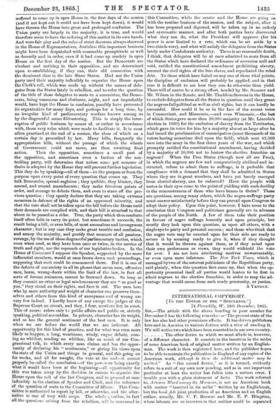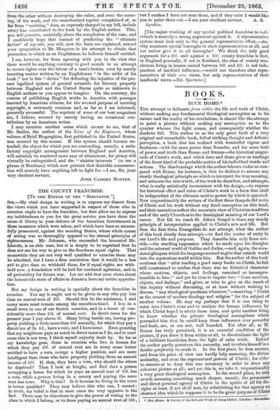INTERNATIONAL COPYRIGHT.
[lo THE EDITOR OF THE SPECTATOR."] 74 Piccadilly, W., 18th December, 1865. SIR,—The article with the above heading in your number for December 3 has the following remarks : —"The present state of the law has also had other pernicious effects. It has drives publishers here and in America to various devices with a view of evading it. We will notice two which have been resorted to in our own country.
The other device to which we must allude is, however, of a different character. It consists in the insertion in the midst of some American book of original matter written by an English- man. The work is then registered here, and the publisher hopes to be able to restrain the publication in England of any copies of the American work, although in these the additional matter may be omitted." As " this second device," as it is termed, evidently refers to a suit of my own now pending, and as in one important particular at least the writer has fallen into a serious error, I trouble you with a plain statement of facts. The work referred to, Artemus Ward among the Mormons, is not an American book with matter "inserted in its midst" written by an Englishman, but the bond fide joint production of an American and an English author, namely, Mr. "C. F. Browne and Mr. E. P. -Hingston, whose labours are so interwoven that neither could be separated
from the other without destroying the value, and even the mean- ing, of the work, and the unauthorized reprint complained of, so far from " omitting," does, as expressly charged in my bill, include every line contributed to the book by the English author. This, you will perceive, materially alters the complexion of the case, and I confidently hope that instead of predicting the " ultimate failure" of my suit, you will, now the facts are explained, extend your sympathies to Mr. Hingston in his attempt to obtain that protection to which as an Englishman he believes himself entitled.
I am, however, far from agreeing with you in the view that there would be anything contrary to good morals in an attempt to secure rights over the labour of a man's brains, even by merely inserting matter written by an Englishman " in the midst of his book ;" nor is this " device " for defeating the injustice of the pre- sent legalized system of general scramble for literary property between England and the United States quite so unknown to English authors as you appear to imagine. On the contrary, the custom of publishing English works in America with passages inserted by American citizens, for the avowed purpose of securing copyright, is extremely common and, as far as I am informed, generally successful. The reprints of some of our best magazines are, I believe, secured by merely having an occasional con- tribution by an American writer.
I may mention another name which occurs to me, that of Mr. Smiles, the author of the Lives of the Engineers, whose volume of Brief Biographies, first published in the United States, was secured by this means. If this system should become ex- tended, the object for which you are contending, namely, a satis- factory copyright arrangement between England and America, will certainly be rendered more easy of attainment, for piracy will virtually be extinguished, and the " sinister interests " (to use a phrase of Bentham) which now prevent that desirable consumma- tion will scarcely have anything left to fight for. —I am, Sir, your very obedient servant,
JouN CAMDEe Horrals.



































 Previous page
Previous page